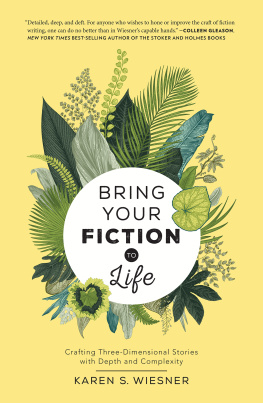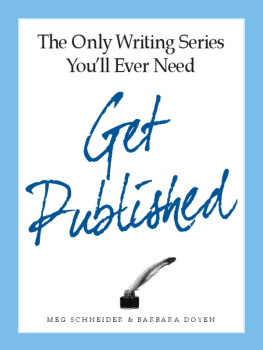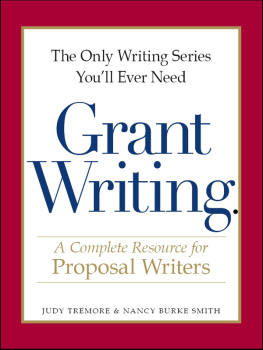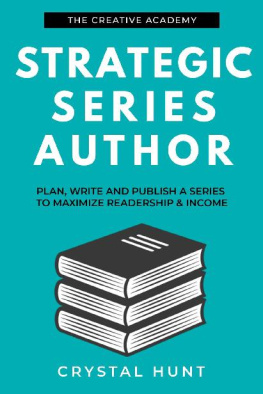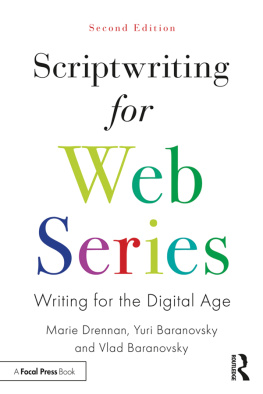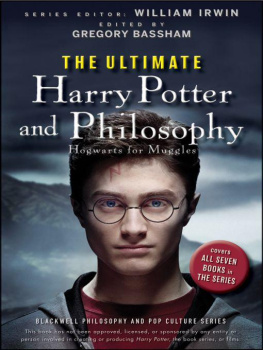W RITING the F ICTION S ERIES
T HE C OMPLETE G UIDE
FOR N OVELS AND N OVELLAS
KAREN S. WIESNER

INTRODUCTION
THE APPEAL OF THE SERIES
The tiger springs in the new year. Us he devours.
~T.S. E LIOT
Imagine youve spent a seemingly endless amount of time trying to figure out what it is you want in this world. Youve been incredibly selfish and ignored the best thing thats ever happened to you, and now that person is walking out of your life with the words, Frankly, my dear, I dont give a damn. Now its all over. You cant forget it until tomorrow because its gone with the wind or is it? What if you could go back to Tara? What if you could get Rhett Butler back?
While Ill keep my mouth shut on the wisdom of taking over someone elses story (especially a story whose author so adamantly did not want to continue it), the fact is that the sequel Alexandra Ripley wrote to Gone With the Wind spent many weeks on the bestseller list because fans of the original desperately wanted to return to Tara and see Scarlett get her happily-ever-after. They werent satisfied to simply let the story go as it ended. To the point of obsession, they had to have more. That inability to let a story go without follow-up or further detail is the hallmark that leads to prequels, sequels, trilogies, and a full series.
Author Thomas Helm has said that the test of a good novel is dreading to read the last chapter. That goes for the author of the book as well as its fans. If youre dreading the last chapter, this may be the best reason your book should become a series. No one wants to let a fantastic book go and will avoid anything that looks like the end. Paranormal author Dana Marie Bell says, Speaking as a reader, I love series. I love revisiting characters, checking in on their happily-ever-afters. Mystery/paranormal author S.D. Tooley adds that readers of series get caught up in the history of characters who become like family, and because their stories are part of a series, fans know theyll get to see them again. This tempers the sense of loss a reader feels in finishing one story. Theres more to hope for.
Writing a series is something that is near and dear to my heart. With five trilogies and twelve series (four of them spin-offs) under my belt or in the worksranging from three to twelve (currently) books eachwriting a stand-alone novel is unusual for me. One novel can spawn many more because my characters become so real, I sometimes feel like the secondaries are tugging on my sleeve while Im immersed in the world they live in, demanding to know when Im going to write their stories. As Abelard said to Heloise, Against the disease of writing one must take special precautions, since it is a dangerous and contagious disease. Writing series feels very much like an obsession to me. Simply getting to know characters through the eyes of the main character in a single book has rarely been enough for me. I need to know who they are, what made them into the people they are inside and out, and what theyre going to do now. My characters feel as real to me as the people who populate my reality. The worlds I create are places I want to return to again and again. My readers tell me the same, and so together we fulfill our mutual need for more of these characters, more of this world, more of this particular story line. You cant get quite the same satisfaction from a stand-alone novel because, with no continuation in store, that sadness always shows up at the end.
Authors who write series promise readers that the fun doesnt have to end, that theres more excitement to come, more adventures and worlds to explore, more of these lives to be lived. Books in a series are comfort reading because you know what youre getting yourself into. Theres no risk. If the author is skillful, and you become invested in a way that takes over your mind and heart, you can allow yourself to leave the physical world and join in a quest with the friends youve made.
As a series author, you can also spend more time developing your characters over the course of the series. You enlarge your loyal readership with a series since these fans will put your books on their auto-buy lists. This can mean less work because youve probably done most of the research with the first book in the series, and all writers know that less research means more writing time.
J.M. Smith, the owner of Wild Horse Press, says, A series is always intriguing to us because they sell better than most stand-alone titles. In a proposal, we like to hear what the author has planned for the series. When an editor contracts a series, he is looking for something compelling that will attract readers in droves. If you can get an editor obsessed and looking for future titles within your series, youll probably be able to do the same with readers if your promotion is done well. If your readership builds, your publisher will also look upon you more favorably and will try to keep all of your books (in your series as well as any others youve written for the house) available for those fans who start in the middle and want to see what else you have to offer. Your publisher might suggest that you keep a series going because one book can sell many others. Nearly always, if a series is selling, the publisher will want more. Miriam Pace, the publisher at Parker Publishing, Inc., says, For an established author whose sales are good, well almost always take a series over a single story because that author already has a reader base. Readers are loyal.
Theres no denying that the series tiger has sprung and is devouring readers of every genre.
WHOS READING, WRITING, AND PUBLISHING THE SERIES?
A better question might be who isnt reading, writing, and publishing series? Ask anyone what the most popular books have been in the last couple years, and inevitably the answers will lead to books within a series: Harry Potter, Twilight, Stephanie Plum, Captain Underpants, Robert Langdon, A Series of Unfortunate Events, Star Wars, and basically anything, both series and non-series, by Nora Roberts. Authors are writing series, publishers are publishing them, and readers are buying them by the truckloads.
In the course of writing this book, I interviewed nearly one hundred authors and publishers of series. These interviews were simply fascinating to me, and youll be reading a lot from them throughout this book. Ill also be putting the interviews in their entirety on my website for readers to enjoy. Visit me at karenwiesner.com, click on the nonfiction button, and look for Writing the Fiction Series to find these interviews.
Like most authors, childrens, young adult, and historical romance writer Mary Jean Kelsos love affair with the series started in her childhood. I write series because, as a young reader, I always wanted to know what happened to the characters after a book I read ended. It was like their lives werent really over yet. I felt a loss that the story was over and wondered what they would do next.
Charlotte Boyett~Compo, multigenre speculative fiction author, concurs: Even if one book in the series isnt as good as the others, most readers will buy the next one simply because they have become invested in the story and the characters. As an author, I dont like leaving [the characters] once Ive put all that time, energy, and creativity into their conception. Its like abandoning your baby. I always discover something I wish Id included or I wish Id had the characters do after the book has been published. Doing another book with the same characters gives me a chance to finish what I started. It also might satisfy the suggestions from readers about where theyd like that character and story line to go next. I pay close attention to reader and reviewer feedback. That way I see what works and what doesnt.


